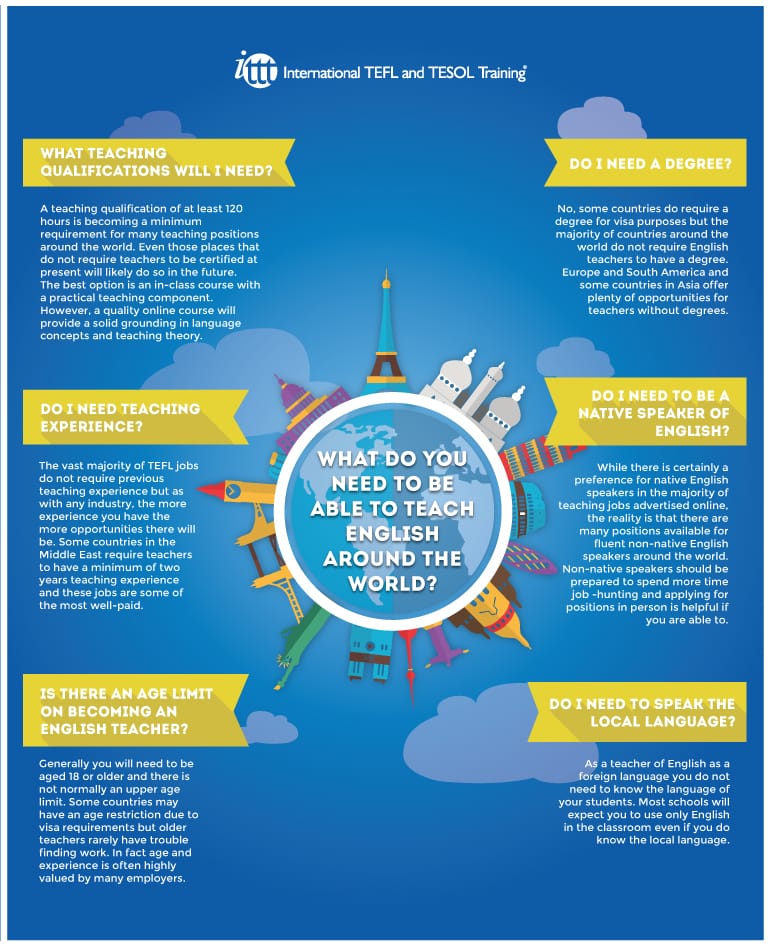TESOL vs TEFL
The Teaching of English:
The most generic term for the field of teaching English is ELT. This simply means:
English Language Teaching.
ELT is a large area, and there are many subdivisions and specialisms. One subdivision is the teaching of English to learners whose first language is not English. The three terms most commonly seen here are TESOL, TEFL and TESL.
A lot of confusion exists around these terms and in particular the question of TESOL vs TEFL, which leads to a number of inevitable questions. You might ask…
- Is one better than the other?
- Do employers have a preference?
- Are they the same?
- How are they different?
- Is one preferable to another in certain countries?
In looking at these various terms we will show that the idea of comparing one against the other, i.e. “TESOL vs TEFL” isn’t very helpful. So what do they mean?
TEFL: Teaching English as a Foreign Language
When the English teaching takes place in a country where the predominant language is not English, such as teaching English in Germany or Japan.
TESL: Teaching English as a Second Language
TESL (sometimes just ESL) applies when teaching English to non-native speakers of English in a country where English is the first language. Examples would be teaching English to Pakistani students in the UK or teaching non-native English-speaking students in an international school with an English curriculum.
While both the above terms are often used in a similar way, the next acronym puts both these terms under one umbrella:
TESOL: Teaching English to Speakers of Other Languages
This combines TEFL and TESL/ESL. The students’ first language is not English, but the environment in which they are learning English is inconsequential.
The bottom line is that the two terms are used interchangeably throughout the English-teaching world, and we shouldn’t really think in terms of TESOL vs TEFL. However, some countries are more familiar with one term than the other, for example TESOL is more common in the USA and TEFL more widely used in the UK

ITTT courses and their qualifications
ITTT offers three paths to TESOL or TEFL certification. ITTT courses can be completed entirely online, through person-to-person attendance at an in-class training center, or both.
ITTT Online TEFL/TESOL courses
A popular route to TEFL/TESOL certification is via courses conducted online, with a number of excellent options offered by ITTT for both new and more experienced teachers.
All ITTT online courses are accredited internationally and include tutor Support.
1. They may be taken from anywhere providing you have a device and an internet connection.
2. There are many options for gaining an ITTT TEFL/TESOL certificate.
3. Online TEFL/TESOL courses can be completed in a timeframe more suited to you.
4. We understand that some course participants may have a preference for the certificate they receive on successful completion. We therefore offer graduates the choice of a TESOL or TEFL certificate when they have finished the ITTT 120-hour or 170-hour course.
The ITTT online TEFL/TESOL course options include:
- 120-hour Certificate Course
- 170-hour Certification Course with Online Specialization
- 220-hour Master Package Course
- 250-hour Diploma in TESOL Course
- 550-hour Expert Package Course
- 60-hour Specialized Course in Teaching English Online
- 60-hour Specialized Course in Teaching English to Young Learners
- 60-hour Specialized Course in Teaching Business English
ITTT In-class Courses
All in-class courses offered are taken over four weeks with a resulting 120-hour TESOL certificate that includes at least six-hours of observed teaching practice.
You can find details of the ITTT TESOL/TEFL centers using the interactive map below.
For a description of what your course would involve see the graphic below.

Combined courses
The ITTT Combined course gives you many of the benefits of online and in-class TESOL/TEFL courses in a single package. Due to the shorter training time in the classroom they are more cost-effective than 100% in-class courses.
The ITTT Combined course is offered at these locations:
- Bangkok, Thailand
- Barcelona, Spain
- New York City, USA
- Paris, France
- Phuket, Thailand
- Rome, Italy
The certificate you receive from completing the combined course is equivalent to the four-week course certificate and indicates six hours of observed teaching practice.

TESOL and TEFL Jobs
To show how employers view the idea of TESOL vs TEFL we will look at a couple of current actual excerpts from job vacancies posted on our website.
1. School teaching position Thailand
Requirements: Minimum bachelor’s degree
TESOL/TEFL preferred
Motivated individuals who are dedicated to teaching and the betterment of their students
2. Online position available.
Requirements: No degree or experience needed
Both non-natives and natives are welcome
TESOL/TEFL preferred
No minimum hours
Complete profile with video + photo (students choose teacher)
Professional attitude
The requirements given here are typical and demonstrate that employers understand that there isn’t really a distinction between TESOL vs TEFL.
You can see this trend for yourself by taking a look at our jobs page here.
Using your TESOL or TEFL certificate to teach English
If you would like more information about teaching opportunities, we have developed country-by-country guides to living and teaching English in a number of countries worldwide. The guides are an excellent introduction to life in each country and provide an insightful peek into local customs.
More information here.
For an idea of the types of salary and living costs while teaching English, with your TESOL or TEFL qualification, have a look at our infographic below.

Lifestyle of a TEFL/TESOL teacher
For more on TEFL and TESOL teacher lifestyles you can review this infographic:




